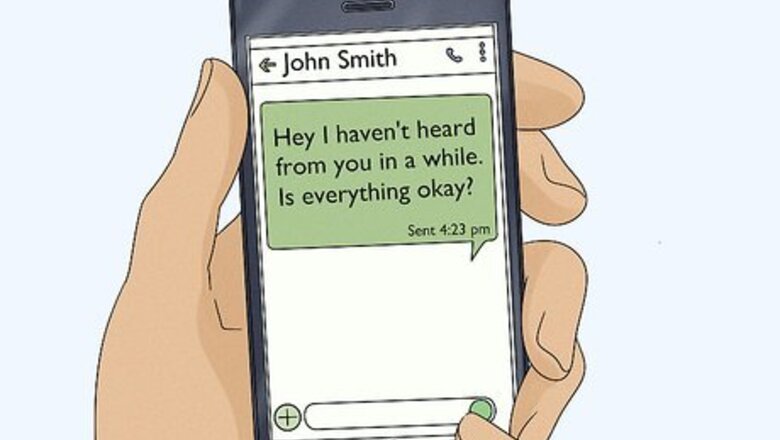
views
"How are you feeling?"
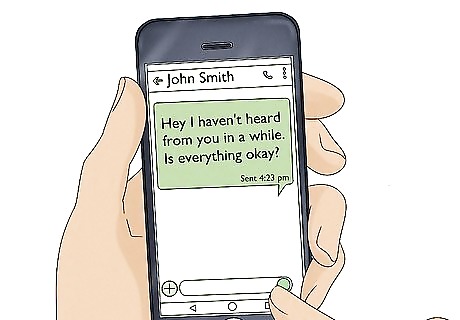
Try a subtle approach to give them a chance to open up. One good way to get a read on the other person's state of mind is just to start a conversation with them. Try giving them a call or sending a text asking how they've been. If there's anything wrong, this will give them a chance to tell you. And even if they don't have much to say at first, it will open the door for more questions. You could also say something like, "Hey I haven't heard from you in a while. Is everything okay?"
"Is something on your mind"?
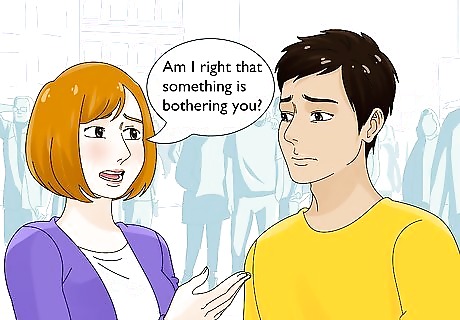
Let them know you can tell their energy is different. Asking this will show the other person that you care about how they feel, and that you can tell something's a little off. However, it doesn't put any pressure on them to reassure you, because you're not outright asking if they're mad at you—you're asking if anything is bothering them in general. Another way to ask this might be, "Am I right that something is bothering you? Do you want to talk about it?"
"It feels like we've been a little distant, can we talk about that?"

Try this if you really feel like their emotions are directed at you. Sometimes it's a little more obvious when someone is upset with you—they might give you dirty looks, answer you with short, terse responses, or get really quiet when you're around. If that's the vibe you're feeling, go ahead and ask what's going on. If the person's mood seems to shift suddenly during a conversation, try asking something like, "Did I say something to offend you?" When you ask something like this in a straightforward way, be prepared for a straightforward answer. They might be holding in some things that you aren't expecting, so just sit back and let them speak their mind.
"Can you explain why that was so upsetting?"

Be curious if you're not sure what's behind their feelings. If the person does say that you did something that bothered them, but you're still not sure exactly why they're upset, don't be afraid to dig a little more. It's really important to understand exactly what happened if you want to avoid conflict with that person in the future. Try to keep your tone calm and even when you ask this—if you come across like you're judging or mocking the person for their feelings, it will just make things worse. When they're talking, just listen quietly without getting defensive. Don't interrupt them to share your own thoughts—although it's fine to say things like, "I understand" or "That makes sense" from time to time.
"Am I hearing this right?"
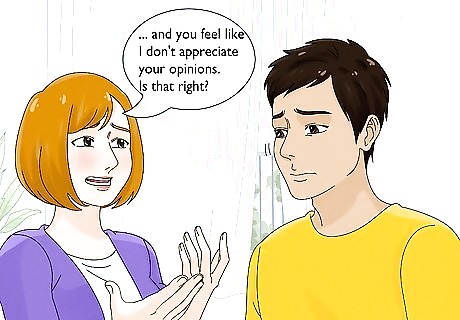
Paraphrase back what they just said to you. When you repeat what the person just said, it will help both of you be sure you're on the same page. Just make sure that when you do this, you do it in a really kind voice—don't belittle their opinions, or the argument will just get worse. For instance, you might say, "It sounds like you're saying that it was insensitive of me to brush off your suggestion about how to paint the living room, and you feel like I don't appreciate your opinions. Is that right?"
"Can I share my perspective?"

Offer your point of view if you think it could help. In some cases, you might feel like if the other person understood where you were coming from, they might not feel upset anymore. Just be careful with this—it will seem insensitive if you come across like you're just trying to prove your point and make yourself seem right. Keep in mind that in a disagreement, it's more important how something came across, rather than the intention that was behind it. Sometimes, it's better to just apologize rather than trying to explain yourself.
"Do you need some space?"
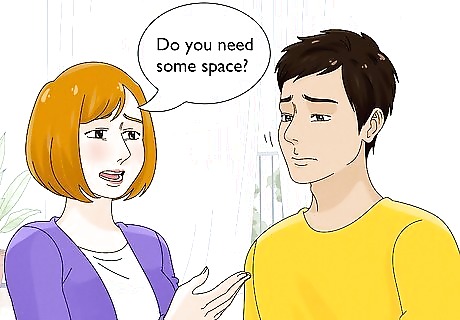
Be willing to back off if they need some time. When someone is upset, they sometimes need time to process how they're feeling before they can begin to move past it. If the person says they're not ready to talk, give them a little time before you reach out to them again. This will be different for everyone. If you live together, you might leave for a few hours, then come home and try to talk again. If you're not super-close, you might wait as long as a couple of weeks. It really depends on the situation, how close you are, and what happened that made the person upset.
"How can I make this better?"

Ask if there's anything that would help. Sometimes, the other person will have a clear idea of what they'd like you to do. For instance, they might say something like, "Please don't put me down in a work meeting again," or "I'd rather you not make comments about my appearance." In that case, do your best to stick to their request so you can hopefully avoid repeating the situation in the future. Don't agree to anything you can't stick to. For instance, if the person says something like, "I want you to quit your job so I don't have to see your face anymore," that's a pretty unreasonable request, and it's fine to say no.
"I'm sorry, can you forgive me?"

Apologize and ask for forgiveness if you want to mend the relationship. Even if you don't feel like you were completely wrong, take responsibility for your actions. If you can see the other person's point of view, sincerely tell them you're sorry. Acknowledge your part in what happened, and ask them if they're willing to forgive you and move on. If the person was offended by something you consider an important value, apologizing may not be appropriate—sometimes you do have to stand your ground. For instance, if they're angry at you because you spoke out in support of trans rights or equality for minorities, it's totally okay if you decide you're just better off ending the relationship.
"Why would they be mad at me?"

Ask yourself this question before you talk to the person. Don't just assume they're mad at you, especially if the two of you haven't had any conflicts lately. If they're just not answering your texts or they seem a little standoffish, there could be another explanation for the way they're acting, and it likely doesn't have anything to do with you at all. For instance, if you bump into someone you know while you're shopping but they don't stop to chat, they might have been in a big hurry or they could have been dealing with something upsetting that day.




















Comments
0 comment